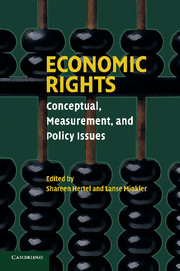Book contents
- Frontmatter
- Contents
- Contributors
- Acknowledgments
- 1 Economic Rights: The Terrain
- SECTION I CONCEPTS
- SECTION II MEASUREMENT
- SECTION III POLICY ISSUES
- 12 Economic Rights and Extraterritorial Obligations
- 13 International Obligations for Economic and Social Rights: The Case of the Millennium Development Goal Eight
- 14 The United States and International Economic Rights: Law, Social Reality, and Political Choice
- 15 Public Policy and Economic Rights in Ghana and Uganda
- 16 Human Rights as Instruments of Emancipation and Economic Development
- 17 Worker Rights and Economic Development: The Cases of Occupational Safety and Health and Child Labor
- APPENDIX 1 Universal Declaration of Human Rights
- APPENDIX 2 International Covenant on Economic, Social, and Cultural Rights
- Index
- References
16 - Human Rights as Instruments of Emancipation and Economic Development
Published online by Cambridge University Press: 18 December 2009
- Frontmatter
- Contents
- Contributors
- Acknowledgments
- 1 Economic Rights: The Terrain
- SECTION I CONCEPTS
- SECTION II MEASUREMENT
- SECTION III POLICY ISSUES
- 12 Economic Rights and Extraterritorial Obligations
- 13 International Obligations for Economic and Social Rights: The Case of the Millennium Development Goal Eight
- 14 The United States and International Economic Rights: Law, Social Reality, and Political Choice
- 15 Public Policy and Economic Rights in Ghana and Uganda
- 16 Human Rights as Instruments of Emancipation and Economic Development
- 17 Worker Rights and Economic Development: The Cases of Occupational Safety and Health and Child Labor
- APPENDIX 1 Universal Declaration of Human Rights
- APPENDIX 2 International Covenant on Economic, Social, and Cultural Rights
- Index
- References
Summary
PRECEPT AND PRACTICE
On 10 December 1948, the General Assembly of the United Nations proclaimed the Universal Declaration of Human Rights, which was a call to a certain universalist commitment to promoting some basic rights that all individuals possessed simply by virtue of being human, and irrespective of their religion, race, gender, and nationality. This was the first time that such a proclamation had been made at a global level and endorsed by virtually every country in the world.
There is of course a long history of individual activism and philosophical pamphleteering for some basic rights for all human beings. Jefferson, Kant, Locke, Gandhi, the poetry of sufi saints and the writings of spiritual leaders, and even many nonbelievers, such as India's first prime minister, Jawaharlal Nehru, and the philosophers Bertrand Russell, David Hume, and John Stuart Mill easily spring to mind. There also had been initiatives undertaken by individual countries to recognize some basic rights of individuals within their national boundaries. The UN Declaration has special significance, because it was the first effort to bring the whole world under a common recognition of rights and to give this a semilegal status. In today's rapidly globalizing world we cannot ask for anything less. The Declaration has had huge ramifications, because many global agreements and initiatives – concerning the rights of the workers, the rights of the children, the treatment of prisoners, the protection of the environment, and economic objectives like the Millennium Development Goals – are outgrowths of that initial proclamation.
- Type
- Chapter
- Information
- Economic RightsConceptual, Measurement, and Policy Issues, pp. 345 - 362Publisher: Cambridge University PressPrint publication year: 2007



